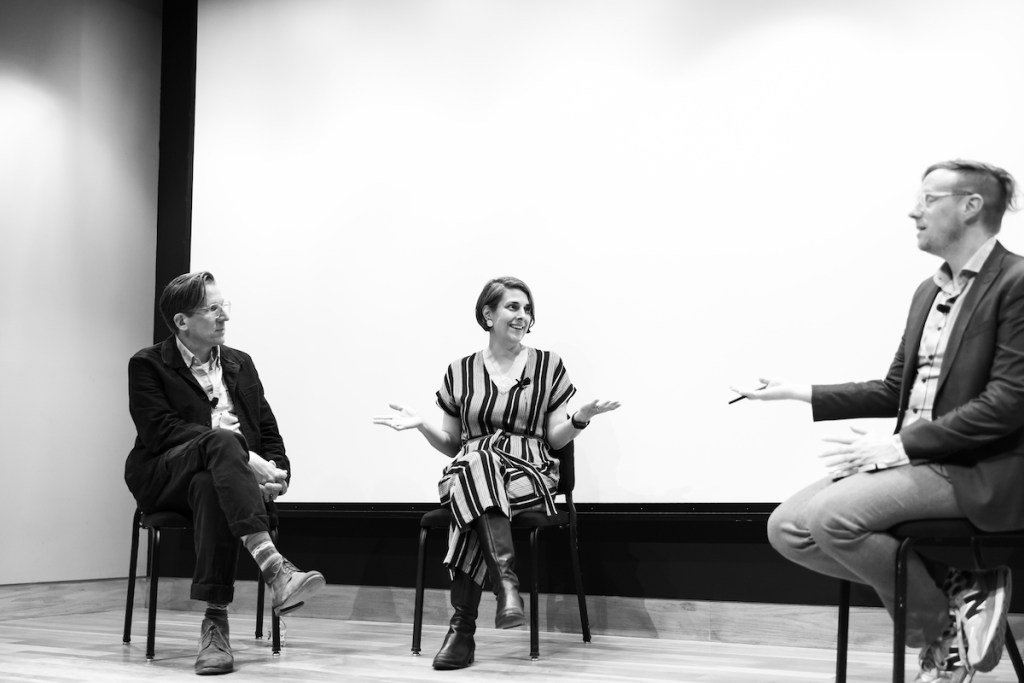Navigating the wobbly tightrope between the artistic and the domestic life is frequently the subject of great art (see current exhibition Scenes from a Marriage: Ed & Nancy Kienholz), and in Santa Barbara Museum of Art’s recent Couples series featuring Cassandra C. Jones and Mikael Jorgensen, it was also the subject of a great conversation.
Jones, a remix visual artist who uses digital images to create often humorously reflective large-scale pieces, and Jorgensen, the Grammy Award–winning keyboardist for the alt-rock band Wilco, spent the first chunk of the night reflecting on their separate artistic practices.
As the son of recording engineer Joe Jorgensen (according to his obituary in Variety, he worked on albums for Frank Sinatra and Engelbert Humperdinck), Jorgensen said he developed a love of both music and technology at an early age, and “while other kids were out smoking and watching The Wall, I was at home keeping it real on the computer.” He met Wilco founder Jeff Tweedy 21 years ago and joined the band soon after that.
Jorgensen also shared some fascinating video footage from Quindar (named after the ubiquitous “beeps” heard in NASA’s audio transmissions), a collaboration with James Merle Thomas where the duo took the NASA Audio and Film Archives and remixed them into an LP and live musical performances accompanied by an immersive, responsive videos.
Sharing a taste of her “collage work that looks like wallpaper installations,” Jones kicked off her portion of the presentation with slides of the cheeky, thought-provoking “Good Cheer,” a 2005 installation composed of snapshots of cheerleaders performing routine stunts that flaunt their briefs, which she described as having the “combination of family values and pornography all in one image.”
Jones, who went on to develop an ongoing residency at the Taft Gardens and Nature Preserve in Ojai (the town where they live with their two sons), in addition to prior residencies in Germany, Canada, and the Czech Republic, as well as installations and exhibitions around the country, said that “Good Cheer” was the piece that really started her career.
She shared work from several projects, including an intriguing series Forever Temporary, inspired by massive area wildfires in 2017 and the subsequent question of what was in the ash on the hills after the Thomas Fire. “All the things that people had bought over years that were reduced to the tiniest fragments,” said Jones of the cactus-like forms she created that were inspired by the rubble and regrowth and the notion that those tiny fragments of ash were absorbed into the soil and will be with us forever.
In addition to their individual practices, the couple enjoys teaching together in what Jorgensen described as “a psychedelic free-for-all.” They work with students (locally at Oak Grove and Thacher Schools — they shared a highly entertaining sampling of kid creations) to teach them how to animate images and remix video and music.
Other than teaching together and family life, they don’t often collaborate officially, “but I don’t think there’s anything we’ve ever worked on that we’re not sharing with each other,” said Jones. An amateur photographer, she said that Jorgensen created most of the images she uses in her collage work these days.
As for advice to other creative couples, Jones offered, “Make sure you have this agreement … our careers pretty much come first. I mean, our kids come first, but beyond that, beyond their health and well-being, if I have a show coming up, Mikael’s like, ‘Go to your studio and do that.’ If he’s got a tour coming up, I say, ‘Go do that.’”
Home for an extended period of time during the pandemic for the first time in their relationship, Jorgensen described that period as a bit of creative reorganization and reawakening for him. Part of what came out of that reevaluation time is a new project he’s working on, a documentary about musician Bob James, who has the distinction of having recorded more than 50 solo records and being the second-most sampled artist in the world of hip-hop, behind the legendary James Brown.
Jones said, “For the most part, our common goal is that everyone gets their work done. And we’re in full support, no matter what, even if it’s not something we’re getting paid to do. It’s still all working toward whatever it is that’s our goal.”

